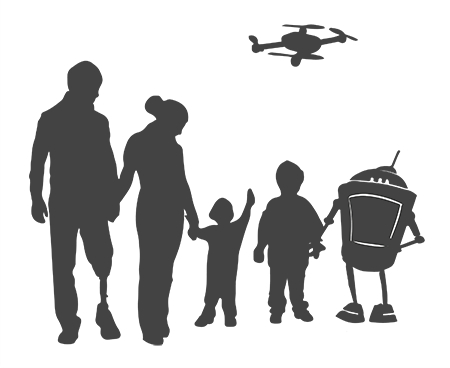


In case you were wondering whether Steve Wozniak is afraid of robots, get this: He probably is. “Computers are going to take over from humans, no question,” the Apple co-founder told the Australian Financial Review earlier this week. He also said that, “If we build these devices to take care of everything for us, eventually they’ll think faster than us and they’ll get rid of the slow humans to run companies more efficiently.” Wozniak goes into so much detail, however, wondering aloud about whether the machine will squash us like ants, or pamper us like pets, that it’s hard to tell whether this was a cathartic expression of his genuine fears, or just the more respectable version of the sort of freshman-year prognosticating happening in any given dorm room, on any given night. But while Wozniak doesn’t have the same prophetic gravitas as an Elon Musk, a Stephen Hawking or a Bill Gates, the list of household names who want robots to plot a path off of humanity’s lawn is growing.
It’s a bad time, in other words, to be staging the most ambitious robotics competition in history. Worse still, the DARPA Robotics Challenge (DRC) Finals, scheduled for June 5-6 in Pomona, California, will feature machines that walk on two legs—imagine the hubris—or skitter across rubble like giant insects. Robots will turn doorknobs, and saw through walls with power tools. The DRC is a robophobic’s worst nightmare.
DARPA is fully aware of this climate of fear, and plans to tackle it head-on. “We actually take these questions about what the future is going to be like, and what the applications are, for the different technologies that DARPA helps to develop, in a very serious way.” said DRC program manager Gill Pratt in a telephone briefing earlier this month. “And we don’t want to presume that we’re the ones who have to come up with the answers, but we do want to be responsible for asking the questions.”
What this amounts to is equal parts adorable and insightful. Attached to the DRC is another contest, called Robots4Us. High school students have until April 1 to send in a two- to-three-minute video that details the robot-assisted future to come. From the contest page:
Five winners will earn a trip to the DRC Finals (with a parent or guardian), and will participate in a discussion on June 7 with experts in the robotics field, including team members from the competition.
There’s a lot to make fun of here, if you’re so inclined. Instead of deploying its own considerable collective brainpower to explore this complex issue, the research wing of the Pentagon is asking teenagers for help. And while that post-finals discussion could yield fascinating ideas, this is a video contest, with entries judged in part on their “technical quality.” Also, it’s called Robots4Us.
But here’s DARPA’s rationale, according to Pratt. “We want to target the generation where we think most of these developments are really going to have a stronger impact. Stronger than the folks my age, for instance.” Pratt sees high school students, in particular, as the right demographic to be looking at these questions right now, “and we’d like to sort of catalyze the discussion between high school students and people who professionally look at these questions of technology and society,” he said.
The research wing of the Pentagon is asking teenagers for help.
The more I think about this contest, the more sense it makes. Despite the frantic tenor and perpetually just-around-the-corner timeframe presented by most robotics coverage, it will be decades before this technology makes or doesn’t make the sort of society-destabilizing impact that some see as inevitable. By then, many of us either within the field or watching it closely will be doddering or dead. Of any group of humans alive today, children have the most to gain and lose from the explosion of autonomous system. And as cute as it would be to hear about all the cookie-baking, building-smashing and general companionship that pre-schoolers want out of tomorrow’s robots, maybe high school is the right cutoff.
We shouldn’t assume that those Robots4Us video entries will unlock the secrets to human-machine harmony. We should, however, applaud DARPA for asking kids to start thinking of solutions. It’s their world, after all, that will be teeming with robots and AI. For the rest of us, the most relevant question probably isn’t whether we’ll live to see machines making pets or corpses of us all. It’s whether they’ll be able to change our diapers.
